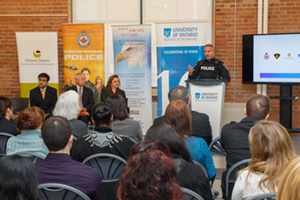Mental health and elder abuse awareness: UOIT celebrates vibrant community partnership
November 12, 2013

OSHAWA, ONTARIO – It all began in 2005 with a simple phone call from an Inspector with the Durham Regional Police Service (DRPS) to a researcher with the Faculty of Health Sciences at the University of Ontario Institute of Technology’s (UOIT). It was a phone call that set in motion an innovative community partnership to better serve individuals who are challenged by mental illness.
“When Inspector Bruce Townley called, he was hoping to discuss ways to educate police about what signs to watch for when officers encountered an person who may be experiencing a mental illness,” said Dr. Wendy Stanyon, Associate Professor, Faculty of Health Sciences, UOIT. “We agreed it would be a great idea to explore developing such a program for police officers. And we decided it would be beneficial to call upon the knowledge of other community experts to help move the project forward.”
Dr. Stanyon called her colleague Marjory Whitehouse of Ontario Shores Centre for Mental Health Sciences (Ontario Shores) in Whitby, Ontario. The two registered nurses discussed the collaboration idea proposed by Inspector Townley. Whitehouse immediately endorsed the concept.
“We share a mutual goal to support everyone in the community on issues of mental health, and in the understanding of mental illness,” said Dr. Stanyon. “Marjory and Ontario Shores believed in the idea from day one. We moved forward remarkably quickly to research, create and evaluate a series of real-life critical-incident police simulation videos. The partners shared in the research, development and implementation of the video education series.”
Today UOIT proudly celebrates with its collaborative partners the success of the simulation video series. Since 2007, the simulations have been used to educate thousands of front-line police officers on how to recognize possible indicators of mental illness and how to respond.
“As a public specialty mental health care hospital, Ontario Shores is always looking for collaborative opportunities to support people living with mental illness,” said Karim Mamdani, President and CEO of Ontario Shores Centre for Mental Health Sciences. “Today we celebrate what can happen when there is a need and forward-thinking individuals and organizations willing to come together to find a solution.”
The original four simulations were mentioned in the report Navigating the Journey to Wellness: The Comprehensive Mental Health and Addictions Action Plan for Ontarians from Ontario’s Select Committee on Mental Health and Addictions; and they were recognized by Accreditation Canada in 2010 as a leading practice. Funding from the Canadian Council on Learning helped deliver research into the effectiveness of simulations, which concluded the videos are as effective as face-to-face learning and that front-line officers found the simulations engaging and realistic.
"The key to the effectiveness of this kind of police training is that it is an interactive tool that was developed by both front-line officers and mental health experts," said Inspector Bruce Townley, Durham Regional Police Service.

As word spread among police services about the effectiveness of the DRPS critical-incident simulations, it became very clear to other services that successful research can make a difference in real life situations. An idea surfaced to see if a second series of videos could be created on the topic of elder abuse awareness. The Ontario Provincial Police volunteered to provide the media expertise and The Regional Municipality of Durham, along with many seniors’ groups and community organizations, contributed significantly to the content development.
“The scenarios were created for officers and community partners alike, following the philosophy of Teresa Lukawiecki, author and researcher on elder abuse,” said Sergeant Robin Sanders, Ontario Provincial Police. “Lukawiecki believes the prevention of abuse and neglect of older adults is a community challenge which will not be resolved quickly by one person or one approach. It will require a community effort to create an environment which reaffirms the rights of older adults to self-determination, respect and dignity.”
The November 12 demonstration of the police simulation videos at UOIT coincided with Open Doors, Open Knowledge, a national initiative of the Association of Universities and Colleges of Canada. Open Doors, Open Knowledge celebrates important community partnerships that benefit all Canadians. From November 9 to 18, universities across Canada will open their doors to the community as part of a national university open house.
Future partners, future directions
The original simulations are currently mandatory training for several police services, including the OPP and DRPS. Other police services – within Canada and abroad – have expressed interest in joining the collaboration and contributing to the development and sharing of additional simulations.
The next phase of research is to evaluate how officers specifically apply the knowledge. A research framework for Phase 2 is in development.
“We are delighted there are more groups lining up to apply the simulations in their jurisdictions,” said Dr. Stanyon. “Each person who completes the training likely shares some of their gained knowledge, which promotes a greater overall understanding of mental health and helps remove mental illness stigmas. We are proud of how we’ve been able to take a basic idea and build it into a successful grassroots partnership that is providing tangible benefits for the community, and we look forward to developing future opportunities.”
-30-
About the University of Ontario Institute of Technology (UOIT)
The University of Ontario Institute of Technology (UOIT) advances the discovery and application of knowledge through a technology-enriched learning environment and innovative programs responsive to the needs of students, and the evolving 21st-century workplace. With more than 9,800 undergraduate and graduate students enrolled in 75 programs delivered by exceptional faculty, UOIT promotes social engagement, fosters critical thinking and integrates outcomes-based learning experiences inside and outside the classroom. UOIT's commitment to accelerating economic growth and social innovation is realized through research collaborations with leading organizations such as Ontario Power Generation, The Hospital for Sick Children (SickKids) and the Durham Regional Police Service. To find out more, visit uoit.ca.
About Ontario Shores Centre for Mental Health Sciences
Ontario Shores Centre for Mental Health Sciences (Ontario Shores) is a leader in mental health care, providing a spectrum of specialized assessment and treatment services for people living with complex mental illness. Patients benefit from a recovery-oriented environment of care, built on compassion, inspiration and hope. Ontario Shores engages in research, education and advocacy initiatives to advance the mental health care system. For more information about Ontario Shores, please visit www.ontarioshores.ca.
About Durham Regional Police Service
The Durham Regional Police Service is the 10th largest municipal police service in Canada. DRPS patrols more than 2,500 square kilometres east of Toronto and York Region, from the southeast shore of Lake Simcoe to the north shore of Lake Ontario. For more information about Durham Regional Police, please visit www.drps.ca.
About Ontario Provincial Police (OPP)
The OPP fulfills its mandate as one of North America’s largest deployed police services with more than 5,600 uniformed officers, approximately 2,200 civilians, over 70 First Nations policing agreements, and more than 900 auxiliary officers. OPP members provide a vast array of services to both the province and more than 315 municipalities, through 165 detachments, six regional headquarter facilities, and OPP General Headquarters.
The OPP serves a province with more than 12 million people, nearly one million square kilometres of land, over 110,000 square kilometres of waterways and more than 72 thousand kilometres of paved roads.
For more information, visit www.opp.ca.
Media contact
Bryan Oliver
Communications and Marketing
Ontario Tech University
905.721.8668 ext. 6709
bryan.oliver@uoit.ca



